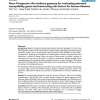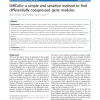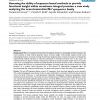189 search results - page 24 / 38 » Recent Advances in Gene Expression Data Clustering: A Case S... |
BMCBI
2008
13 years 7 months ago
2008
Background: Millions of single nucleotide polymorphisms have been identified as a result of the human genome project and the rapid advance of high throughput genotyping technology...
BMCBI
2010
13 years 6 months ago
2010
Background: Large microarray datasets have enabled gene regulation to be studied through coexpression analysis. While numerous methods have been developed for identifying differen...
BMCBI
2007
13 years 7 months ago
2007
Background: Efforts to predict functional sites from globular proteins is increasingly common; however, the most successful of these methods generally require structural insight. ...
JCP
2006
13 years 7 months ago
2006
Most Gene Regulatory Network (GRN) studies ignore the impact of the noisy nature of gene expression data despite its significant influence upon inferred results. This paper present...
GECCO
2005
Springer
14 years 1 months ago
2005
Springer
Two of the attractions of search-based software engineering (SBSE) derive from the nature of the fitness functions used to guide the search. These have proved to be highly robust...



